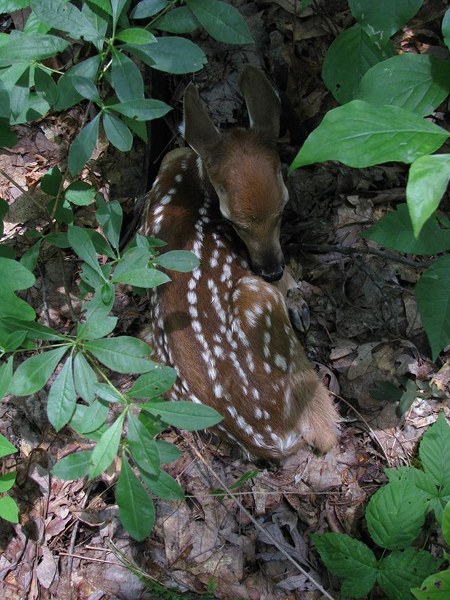
Safe and sound. While many people might consider it abandoned, the mother is nearby nourishing herself while the fawn rests in a safe place in thick cover. (Photo credit: TWRA/Sterling Daniels)
MORRISTOWN—Calls reporting abandoned white-tailed fawns are pouring in, and the Tennessee Wildlife Resources Agency is reminding people to think twice before removing them from the wild in an attempt to rescue them, even when it seems like they’ve been abandoned.
TWRA Wildlife Biologist Sterling Daniels offers this information to those who may be considering “rescuing” a fawn that in most cases, would have been better left alone: “White-tailed deer have a very effective survival strategy for their offspring that may be misinterpreted by many people and it is very rare for a doe to ever abandon a fawn. Fawns are typically born May through July, with June being the most common month. For the first weeks of a fawn’s life, the mother will keep her distance from the bedded newborn only returning for just a few hours each day for nursing. This survival strategy reduces the chance of leading predators to their location. If someone encounters a fawn, the best thing to do is leave it alone.”
Only if the fawn is injured or the mother is confirmed dead should action be taken to assist the animal by contacting the TWRA for further assistance. If an otherwise healthy fawn has been inadvertently handled or removed from the wild for some reason, take it back to the location it was found as quickly as possible, preferably within eight hours.
“The old myth that a doe will not be receptive to her fawn once it has been handled is not true,” Daniels said.
Carter County Wildlife Officer John Ripley is also seeing a dramatic spike in calls regarding abandoned fawns.
“The Wynn Wood Wildlife Rehabilitation Center in Carter County is near capacity for orphaned fawns,” Ripley said. “There is also great potential for attachment, and (it) becomes a captive wildlife situation when someone takes in a fawn and tries to care for it.”
Ripley has already issued a citation for someone keeping a fawn captive inside an apartment.
More information will be added as it becomes available.
Copyright 2015 Oak Ridge Today. All rights reserved. This material may not be published, broadcast, rewritten, or redistributed.





Leave a Reply